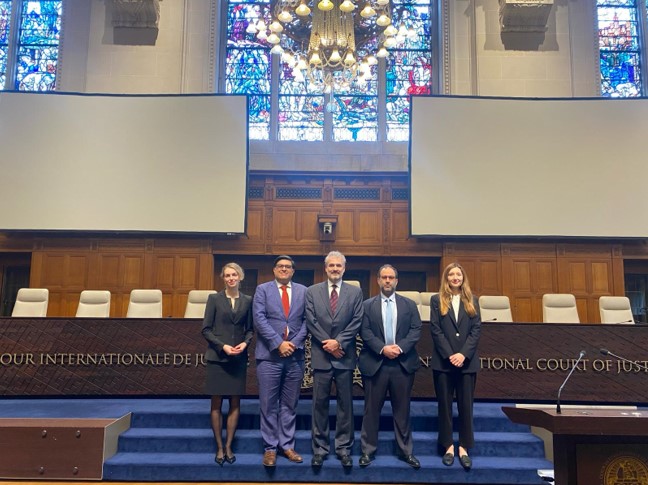Published on 23 May 2024 in Client Alerts
Barbados files written statement in ground-breaking International Court of Justice advisory proceedings on climate change
On 29 March 2023, the United Nations General Assembly adopted a resolution co-sponsored by Barbados requesting that the International Court of Justice (the “ICJ” and the “Court”) give an advisory opinion on the obligations of States under international law in respect of climate change (the “Obligations of States in respect of Climate Change Case” or the “Climate Change Case”). A year later, on 22 March 2024, Barbados submitted a written statement to the Court providing its observations on the relevant legal and factual issues in the Climate Change Case.
ICJ advisory opinions
Advisory opinions issued by the ICJ are rare. There have been 28 issued to date. The Court’s advisory opinions carry great weight in international law and can significantly influence international relations. They provide authoritative guidance as to the existence and content of legal norms applicable to the relevant subjects presented to them in the request for an advisory opinion.
Member States of the United Nations can participate in ICJ advisory opinion proceedings. They do so by providing written and oral statements to the Court. International organisations can also participate, if permitted by the ICJ.
The Climate Change Case and Barbados’s written submissions
In the Climate Change Case, 83 States including Barbados have submitted (individually or collectively) statements to the ICJ. Twelve international organisations also submitted statements, including the Pacific Islands Forum, the Alliance of Small Island States, the Organisation of African, Caribbean and Pacific States and the Commission of Small Island States on Climate Change and International Law.
The ICJ climate change advisory proceedings concern one of the most imperative problems of our time: the globally disastrous consequences caused by anthropogenic greenhouse gas emissions. These consequences include extreme weather conditions, sea level rise and harm to human, animal and plant life. Small-island States in particular, including Barbados, are disproportionately affected by these adverse effects. Barbados’s active participation in the Climate Change Case is a reflection of its commitment to global efforts towards mitigating, adapting to and compensating for the effects of climate change.
Barbados’s written submission identifies the legal obligations of States with respect to climate change. These include the obligations to provide redress for historic and current harm (advancing the consensus that led to the historic Bridgetown Initiative and the Bridgetown Declaration), to mitigate and to adapt to climate change. Barbados’s submission contains supporting references to over 500 legal authorities, including multilateral, regional and bilateral treaties; State practice; the principles of law common to different nations; and the writings of the most qualified jurists. Barbados’s submission also demonstrates that the relevant legal principles were so timeless and universal that they have been accepted by peoples and nations around the world for many centuries past. Thus, the relevant principles are embedded in the statutes of many civilisations, including in ancient Chinese, Buddhist, Hindu, Islamic, and Roman laws.
Barbados’s written submission also discusses how the scientific basis for climate change has been widely known since it was discovered in 1896 by the Swedish chemist Mr Svante Arrhenius. It has been subsequently confirmed for at least the last six decades by scientists, academics, governments, and private industry groups around the world.
Next steps in the Climate Change Case
States now have until 24 June 2024 to analyse and submit written comments on the written statements made by other States and international organisations. The final stage of the proceedings will be an oral hearing, which will take place at the seat of the ICJ in The Hague – the Peace Palace. This has not yet been scheduled. At the hearing, States will have the opportunity to make oral submissions to the Court.
Barbados’s Representative before the ICJ in the Climate Change Case is Ambassador François Jackman, Ambassador and Permanent Representative at the Permanent Mission of Barbados to the United Nations in New York. Barbados’s Co-Representative is Robert Volterra, partner at Volterra Fietta and visiting professor at University College London.
Barbados instructs Volterra Fietta as its external counsel and advocates in the Climate Change Case. Volterra Fietta has had the honour to advise and represent Barbados for a number of decades across a broad range of public international law issues. These include Barbados’s successful UNCLOS Annex VII maritime delimitation case, its successful PCA investment treaty arbitration defence, multiple successful transboundary hydrocarbon or boundary or joint development zone treaty negotiations and general inter-State treaty drafting.
Volterra Fietta has been working for a number of years on climate change issues with Barbados’s Prime Minister’s Office, Ministry of Foreign Affairs and Foreign Trade, and Solicitor General Chambers. The Volterra Fietta team working on the Climate Change Case includes lawyers from every inhabited continent in the world and includes a number of recently-graduated lawyers from Barbados. As with all its State clients around the world, Volterra Fietta includes in the services that it provides to the Government of Barbados regular training, secondment and capacity-building opportunities. Currently, this includes training government officials in Barbados’s Solicitor General’s Chambers and Ministry of Foreign Affairs and Foreign Trade on the procedural and substantive issues relevant to the Climate Change Case at the ICJ. In addition, further reflecting Volterra Fietta’s commitment to increase human technical capacity for its government clients around the world, a number of Barbadian government lawyers from the Solicitor General’s Chambers are now and will continue to be seconded to the VF offices in London for in-person training across all aspects of the firm’s international law practice.
Volterra Fietta is one of the three law firms in the world that regularly represents fee-paying clients in cases before the International Court of Justice. The firm has never lost a case at the Court. Amongst its clients’ recent victories, there are Kenya’s remarkable maritime delimitation award in the Maritime Delimitation in the Indian Ocean (Somalia v Kenya) case and the Democratic Republic of the Congo’s USD 325,000,000 compensation in the Armed Activities on the Territory of the Congo (Democratic Republic of the Congo v Uganda) case.

Photo: Members of Barbados’s external counsel team from Volterra Fietta in The Hague to file Barbados’s written statement at the International Court of Justice (left to right: Florentine Vos, Gunjan Sharma, Robert Volterra, Ahmed Abdel Hakam, Magdalena Kowalczuk Asher).
For further information, contact info@volterrafietta.com.



